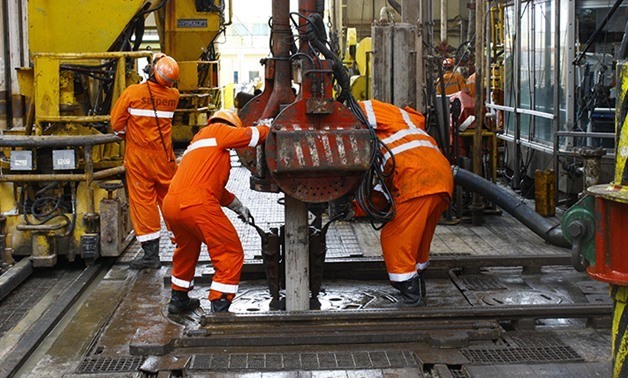
Development works in Zohr field- Photo courtesy of Eni website
CAIRO - 13 January 2018: Egypt officially started operations of the Mediterranean’s giant gas field Zohr last month, less than two and a half years since its discovery
and is currently producing 350 million cubic feet a day.
Development works of Zohr went faster than scheduled, as the initial plan was to start production in 2019. But the government is now expecting self-sufficiency of natural gas before the end of 2018, with gas production amounting to 6 billion cubic feet a day. The 350 million cubic feet per day output is the first result of a series of phases in the field. Minister of Petroleum and
Mineral Resources Tarek El Molla announced in late December that the first phase of the project would be finalized in June 2018, when production will hit more than 1 billion cubic feet a day. Zohr gas is now pumped through the national grid, processed at the Ministry of Petroleum’s gas treatment plant in Port Said.
The newly added production capacity pushed up Egypt’s natural gas production to 5.5 billion cubic feet per day, up from 5.1 billion.
Discovered in 2015 by Italian energy company Eni, Zohr gas field covers an area of 100 square meters with a depth of 1,450 meters. Investing around $10 billion in
the project, Eni estimates a total output of approximately 30 trillion cubic feet of gas. The new field will help secure energy needs of a country that consumes around 6 billion cubic feet of gas a day, with 65% of them going toward the electricity sector.
Record-breaking deal for foreign partners
The Mediterranean’s largest field helped Eni achieve an all-time high production in December as the company announced in late December that it reached a production
record of 1.92 million barrels of oil equivalent per day.
Zohr, Angola’s East Hub field, Ghana’s OCTP project and Indonesia’s Jangkrik were the stars of Eni’s 2017 operations, proving the success to Eni’s exploration and
development solutions that involve a reduction in the time-to-market of new projects.
“The start-up of Zohr is the direct result of our unique know-how, our ability to innovate in technology and of our tenacity in pursuing even the most challenging goals,
of which we are very proud,” Eni’s CEO, Claudio Descalzi said in a December statement.
So far, Zohr has allowed Eni to generate $9 billion from exploration activities between 2014 and 2017. After Eni sold stakes in the concession to Rosneft and BP in 2017, the field’s stakeholders are now Eni (60%), Rosnedft (30%) and BP (10%). BP also expressed its happiness with the production start date.
“We are proud to have worked with Eni, Rosneft and the Egyptian government to deliver a project that is strategically important for Egypt and will help meet the country’s growing energy demand,” CEO of BP Bob Dudley said.
Zohr marks the biggest development program that BP was able to deliver in one year. “The development of Zohr in a record time has brought a new critical source of energy to the Egyptian market,” regional president of BP in North Africa Hesham Mekawi also said.
Mekawi added that BP is playing a crucial role in developing Egypt’s energy sector as two more projects, Atoll and the second phase of the West Nile Delta project, will
bring new gas resources into production.
What’s in it for Egypt? Minister El-Molla explained in statements that the field will save around $60 million per month and $720 million per year at this stage. “Zohr will also provide a worth of five LNG shipments that Egypt used to import, which will consequently support the balance of payments,”he added.
On the shares of Eni, Molla explained that Eni and the Egyptian government will get 40% of the output to compensate for the production cost. Another 18% will be used by Eni to get yields on the capital they invested in the project, “then Eni will also get 12% of the remaining stakes,” he said, noting that they have an agreement with Eni to decrease their shares of the revenues when the production goes up.
Zohr production will help the country offset burdens on its foreign currency as the government is planning to stop importing LNG, “Egypt will have to buy output from
shares of other stakeholders in the field to meet local demands, and to stop importing LNG,” Molla noted.
Egypt heavily imports LNG as in 2017 alone it signed contracts to import between 100 and 108 LNG shipments, including 43 to 45 cargoes in government-togovernment
contracts from Oman, Russia’s Rosneft PJSC and France’s Engie SA.
With regards to exporting gas produced from giant offshore field on the Mediterranean, Zohr, El-Molla said Egypt can allow foreign oil companies working on gas
projects to export their production share after five years, in case the domestic market does not need it.
The field is also expected to benefit the industrial sector as Minister of Industry Tarek Kabil expected Zohr production to attract investment in high energy-consuming
industries.
“There is a constant supply of gas to factories for over a year and a half now especially for fertilizers,steel and ceramics factories,” he said.
More positive outcome is expected as the second phase is due to start soon by mid 2018, including seven wells, according to the Ministry of Petroleum.

Comments
Leave a Comment